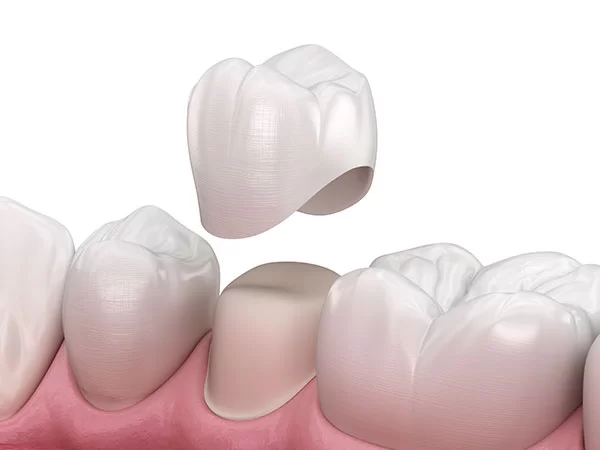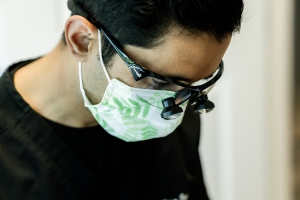Restore Your Smile with Porcelain Dental Crowns
Porcelain dental crowns are an effective solution for restoring and enhancing damaged, discolored, or misshapen teeth. They offer a durable and natural-looking way to protect your teeth while improving your smile’s aesthetics.
If you’re considering porcelain dental crowns in Hilliard, OH, Fishinger Dental is here to help. Call our Hilliard dental office at (614) 771-6060 to schedule your consultation with our Hilliard dentist today!

What Are Porcelain Crowns?
Porcelain dental crowns are custom-made caps designed to cover the entire visible surface of a damaged tooth. Crafted to match the size, shape, and color of your natural teeth, porcelain crowns restore the functionality and appearance of your smile.
Porcelain, a ceramic material, mimics the translucence and color of natural tooth enamel, making it a preferred choice for front teeth or other highly visible areas.
Types of Porcelain Crowns
- Full Porcelain/Ceramic Crowns: They’re fully porcelain, offering the most natural appearance. They’re ideal for patients with metal allergies or those seeking exceptional aesthetics.
- Porcelain-fused-to-metal (PFM) Crowns: These crowns feature a metal base covered with porcelain. While durable, the metal underneath can sometimes show as a dark line near the gum line.
- Zirconia Crowns: Known for their strength and durability, zirconia crowns are another excellent option. These metal-free ceramic crowns are resistant to chipping and offer a natural look.
Benefits of Porcelain Crowns
Porcelain crowns provide several advantages for patients, including:
- A Natural Look: Designed to blend seamlessly with your natural teeth.
- Durability: Strong enough to withstand daily chewing and speaking.
- Stain Resistance: Unlike natural teeth, porcelain crowns resist discoloration.
- Versatility: Effective for treating decayed teeth, broken teeth, and misshapen teeth.
- Enhanced Oral Health: Protects damaged teeth and prevents further decay or damage.
See how our porcelain dental crowns improve our patients’ smiles: Jim’s case study and Preston’s case study.
Drawbacks of Porcelain Crowns
While porcelain crowns offer many benefits, there are also some drawbacks to consider, including:
- Cost: Porcelain crowns can be more expensive than other types of dental restorations, such as composite fillings or metal crowns.
- Sensitivity: Some people may experience increased sensitivity after getting a porcelain crown.
- Potential for Chipping: While porcelain is durable, it’s not indestructible. Porcelain crowns can chip or crack if they’re exposed to excessive force or trauma.
The Porcelain Crown Process
Consultation
During your initial visit to our Hilliard dentist’s office, we’ll evaluate your teeth and discuss your treatment options. Digital impressions may be taken to ensure a proper fit for your crown.
Tooth Preparation
Once you and your dentist have decided on porcelain crowns as the best solution, the next step is to prepare the affected teeth. We’ll clean the affected tooth, removing tooth decay or damage. Dr. Nathan Desai will then shape the tooth to make space for your crown.
Impressions
After preparing the tooth, we’ll take precise molds or digital scans to help craft a custom crown tailored to your smile.
Temporary Crown Placement
While your permanent crown is being created in a dental laboratory, your dentist will place a temporary crown to help protect the treated tooth.
Crown Placement
Once your porcelain crown is ready, you’ll return to the dentist’s office for the final placement. Your custom porcelain crown will be securely fitted and adjusted for comfort, functionality, and a natural-looking appearance.
Caring for Your Porcelain Crown
With proper care, porcelain crowns can last 10 to 20 years. Here are some tips on caring for your crown to extend their lifespan:
- Brush and floss regularly to maintain good oral health.
- Avoid biting down on hard objects like ice or pens.
- Schedule regular dental check-ups to monitor your crown’s condition.
Alternatives to Porcelain Crowns
Depending on your dental needs, there are several options to consider:
- Composite Resin Fillings: Affordable and ideal for smaller repairs.
- Gold Crowns: Durable and non-abrasive, but less popular for visible teeth.
- Zirconia Crowns: Provide a balance of strength and aesthetics.
- Dental Veneers: A conservative option for improving the appearance of front teeth.
- CEREC® Same-Day Crowns: Convenient, single-visit ceramic crowns.

Frequently Asked Questions
How long do porcelain crowns last?
With proper care and maintenance, porcelain crowns can last 10 to 20 years. However, their lifespan can vary depending on factors such as oral hygiene practices, diet, and the amount of wear and tear they experience. Porcelain crowns are known for their durability and longevity.
How much do porcelain crowns cost?
Porcelain crowns are an investment in your smile and dental health. The cost varies depending on the number of crowns needed, your dental insurance, and the complexity of the case.
Does getting a porcelain crown hurt?
Not at all. Your dentist will use a local anesthetic to numb the area and make the procedure as comfortable as possible. After the procedure, you may experience some sensitivity or soreness, but this should subside within a few days.
Can porcelain crowns stain over time?
Porcelain is stain-resistant, but maintaining good oral hygiene and avoiding excessive coffee, tea, or tobacco use will keep your crowns looking their best.
Discover the Perfect Solution for Your Smile at Fishinger Dental!
If you’re ready to restore your smile with porcelain dental crowns, schedule an appointment with Fishinger Dental today. Call us at (614) 771-6060 or visit our Hilliard dental office.
We proudly serve patients from Columbus, Dublin, Upper Arlington, Grove City, Westerville, and surrounding areas. Let us help you achieve a smile that’s both healthy and beautiful!







